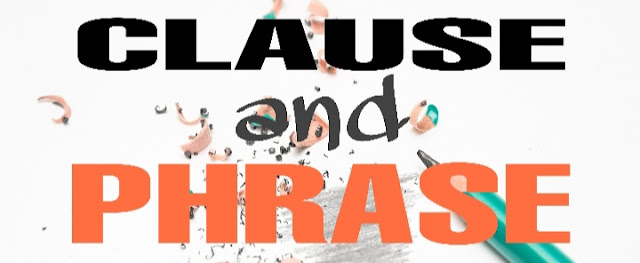Clause and Phrase
Clause and Phrase: In this post you'll get to know about clause and phrase and its uses with examples.
What is Clause ?
Meaning of clase: A unit of grammatical organization next below the sentence in rank and in traditional grammar said to consist of a subject and predicate.
Clause defination
A clause is a group of related words containing a subject and a verb. It is a larger word group than a phrase and includes a little more information.Types of Clauses
There are two types of clauses• Independent Clause (Principal Clause)
• Dependent Clause (Subordinate Clause)
Independent Clause
An Independent clause is the main clause in a sentence. It can stand alone and it can be called a sentence. It does not start with subordinate words such as when, which or if.The main properties of an independent clause are
• It contains a subject.
• It contains an action.
• It expresses a complete thought.
e.g. • I will look into the matter.
(Here 'I' is the subject and 'will look into the matter' is the action)
• Our school is closed.
(Here 'Our school' is the subject and 'is closed' is the action)
Dependent Clause
A Dependent clause is a subordinate clause, it starts with subordinate words. It cannot stand alone as a sentence and is labelled according to its function in the sentence.Dependent Clauses are of three types
(i) Noun Clause
(ii) Relative Clause &
(iii) Adverb Clause.
Noun Clause
A noun clause is a dependent clause that acts as a noun, begins with words such as how, what, whatever, when, where, whether, which, whichever, who, whoever, whom, whomever, why and that.These words generally come before the subject and the verb of the noun clause. Noun clause can act as subjects, direct objects, indirect objects, predicate nominatives or objects of a preposition.
e.g. • Let him do whatever he wants.
( whatever he wants is a noun clause, it contains 'he' as subject and 'wants' as verb.)
• I wonder how long we should wait here.
( how long we should wait here is a noun clause, it contains 'we' as subject and 'should wait' as verb phrase)
Relative Clause
Relative clause are dependent clauses introduced by a relative pronoun (that, who, whom, whose, which, whomever, whoever, whichever). Relative clauses add extra information to a sentence by defining a noun. Relative clauses are also called adjective clausesThe introductory words used for various categories of nouns are
• For people who, whose or what
• For Things which or that
• For Places where
• For Times when
• For Possession whose
e.g. • He is the boy whose mother is principal of our college.
(Whose mother is principal of our college is a relative clause, it contains 'whose' as relative pronoun 'principal' as subject 'is' as verb)
• We visited the place where my uncle lives.
(Where my uncle lives is a relative clause, it contains 'where' as relative adverb 'uncle' as subject 'lives' as verb)
Adverb Clause
Adverb clause or adverbial clause is a word or expression in a sentence that functions as an adverb.It tells something about how the action in the verb was done. It adds extra information about the time, place, manner etc to a sentence and modifies the verb.
The adverb clause may come before or after the main clause. When it comes before the main clause, a comma is used to separate the two clause but when it comes after the maim clause then comma is not necessary.
e.g. • You will get good marks if you write neat and clean.
(Tells us under what conditions the good marks you will get)
As a dependent clause, it cannot stand on its own and must connect to the main clause or an independent clause with a conjunction to form a complete sentence.
Types of Adverb Clause
a. Adverb Clause of Time: We use adverb clause of time to modify a verb in the main clause and to tell the time when an action takes place.Subordinating conjunctions used are when, whenever, anytime, before, after, till, until, while, since, just, as, as soon as, as often as, as long as, now that etc.
e.g. • My father was reading a news paper when he came in.
• As soon as I saw him, he left the place.
b. Adverb Clause of Condition: We use adverb clause of condition to modify a verb in the main clause and to tell the condition under which an action takes place or someone does something.
Subordinating conjunctions used are if, even if, whatever, if..not, unless, supporting that, provided that, in the condition that, as long as that etc.
e.g. • If it rains, I will not go out.
• You won't pass unless you work hard.
Clause Examples
1. Hari told me that he was hungry.2. This is the Book which I was searching.
3. Our success depends on how we prepare ourself.
4. Will you wait until I get ready ?
5. You have to take medicines whether you like it or not.
Other topics
• Pronoun
• Determiners for class 10
• Determiners for class 11
• Prepositions
• Voice change








No comments:
Post a Comment
Kindly donnot paste any SPAM link. Thank you very much for reading, Happy learning.